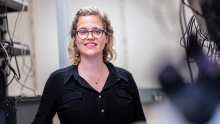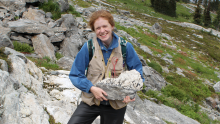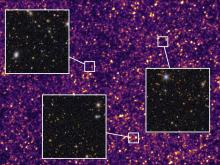Three new Canada Research Chairs have been appointed at UBC Science, with an additional two renewed at the Faculty in the most recent round of Chair announcements.
The new and renewed CRCs at UBC Science are worth $3.5 million, and boost the faculty's research capacity in conservation, algorithm design for large scale communication and transportation networks, and fisheries management.
"The Canada Research Chairs program supports leading edge and innovative research across disciplines," says Helen Burt, Associate Vice President Research and International at UBC. "The chair holders represent some of the brightest minds in their respective fields and their contribution to knowledge and impact to society cannot be overstated."
Thirteen Canada Research Chairs valued at $11 million were appointed at UBC this funding round. UBC holds the second largest complement of CRC allocations -- 186 -- of any university in the country.
New CRCs
Amy Angert, Canada Research Chair in Conservation Ecology, will use targeted experiments to determine how climate, species interactions, and dispersal create range edges and quantify evolutionary potential of range-edge populations. Ultimately, this research will help to guide management and policy decisions concerning climate change adaptation and mitigation.
Nicholas Harvey, Canada Research Chair in Algorithm Design, is looking for the most efficient algorithms for problems involving large-scale networks: communication networks, social networks, and transportation networks. He uses cutting-edge mathematical tools to create practical applications for real-world networks.
Steven Martell, Canada Research Chair in Quantitative Fisheries Science, is developing unique tools and testing alternative fisheries management procedures for Canadian fisheries in order to improve our ability to manage risk and make more informed decisions about the impacts of policy on society.
Renewed CRCs
Christian Schoof, Canada Research Chair in Global Process Modeling, is using simulations to address the dynamics of subglacial melt water drainage and its effect on ice flow speeds – a key process in both, Antarctica and Greenland.
Robert Shadwick, Canada Research Chair in Integrative Animal Physiology, is studying the biomechanics in fishes, particularly the specializations that power high-speed and unsteady maneuvers – and in turn, better understand the evolution of large body size in whales.
Musqueam First Nation land acknowledegement
We honour xwməθkwəy̓ əm (Musqueam) on whose ancestral, unceded territory UBC Vancouver is situated. UBC Science is committed to building meaningful relationships with Indigenous peoples so we can advance Reconciliation and ensure traditional ways of knowing enrich our teaching and research.
Learn more: Musqueam First Nation
Faculty of Science
Office of the Dean, Earth Sciences Building2178–2207 Main Mall
Vancouver, BC Canada
V6T 1Z4


